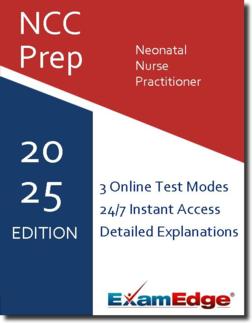NCC Neonatal Nurse Practitioner (NNP) Practice Tests & Test Prep by Exam Edge - Blogs
Based on 17 Reviews
- Real Exam Simulation: Timed questions and matching content build comfort for your NCC Neonatal Nurse Practitioner test day.
- Instant, 24/7 Access: Web-based NCC Neonatal Nurse Practitioner practice exams with no software needed.
- Clear Explanations: Step-by-step answers and explanations for your NCC exam to strengthen understanding.
- Boosted Confidence: Reduces anxiety and improves test-taking skills to ace your NCC Neonatal Nurse Practitioner (NNP).



